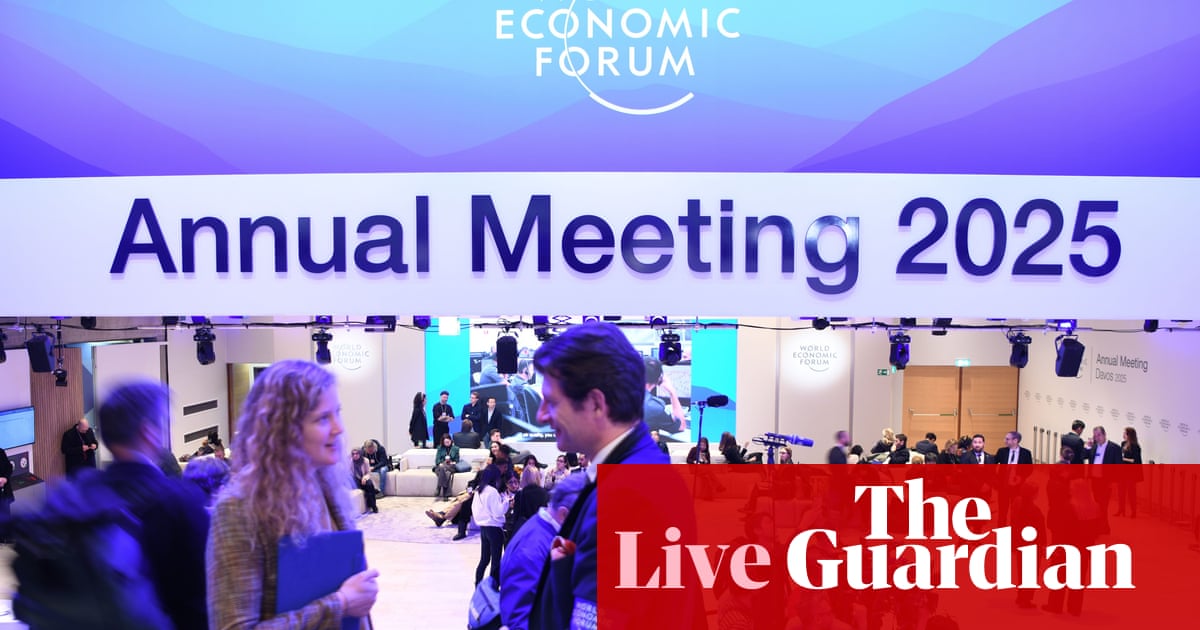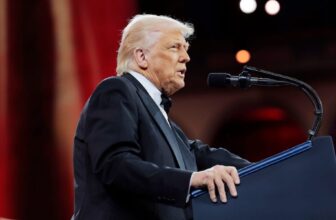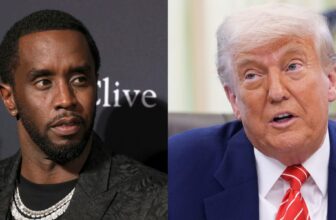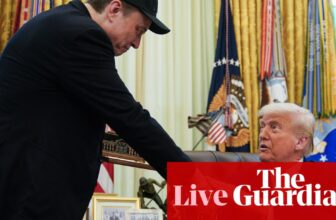
Try our newest merchandise
Introduction: US financial system outperforming as Trump rocks Davos
Good morning from Davos, the place it’s the ultimate day of the World Financial Discussion board.
The worldwide elite right here in Davos are catching their breath after being addressed by Donald Trump final night time.
In a bombastic speech by videolink, Trump declared he needed decrease world oil costs, rates of interest and taxes, in addition to an enormous leap in Nato army spending.
He additionally appeared to point he would impose tariffs on all imports to the US – though there have been few particulars actually.
As Trump put it:
“Come make your product in America and we gives you among the many lowest taxes as any nation on earth.
“However if you happen to don’t make your product in America, which is your prerogative, then very merely, you’ll have to pay a tariff — differing quantities — however a tariff, which is able to direct a whole lot of billions of {dollars} and even trillions of {dollars} into our treasury to strengthen our financial system and pay down debt below the Trump administration.”
Trump’s feedback moved the markets, with the oil worth dipping after he advised Davos he would push Saudi Arabia and Opec to decrease crude costs.
His name for decrease rates of interest lifted the S&P 500 to a report excessive.
Ipek Ozkardeskaya, senior analyst at Swissquote Financial institution, explains:
Apart from the intention of decreasing power costs, most of Trump’s needs are inflation-boosters.
The brand new U.S. administration has been a major subject of dialogue at WEF this week, together with AI, Europe’s lagging financial system, the power transition and the way forward for globalisation.
S&P International Scores’ chief economist, Paul Gruenwald, reckons delegates right here have gotten used to Trump’s working mannequin, saying:
The doubtless volatility and ongoing uncertainties in Trump 2.0 have been internalized and are actually seen as a value of doing enterprise.
The U.S. financial system is seen by everybody in Davos as outperforming the remainder of the world by a big margin on the again of productiveness features in addition to fiscal largesse. Non-U.S. attendees, particularly, famous a dissonance between the optimistic U.S. macro efficiency and the damaging political tone of the brand new administration.
In the present day we’ll hear how prime policymakers really feel concerning the scenario, with IMF managing director Kristalina Georgieva and ECB president Christine Lagarde.
The agenda
9am CET / 8am GMT: Session on Renewing the Promise of Democracy
10.15am CET / 9.15am GMT: A session on the US-EU-China Triangle
11am CET/10am GMT: A session on the International Financial Outlook with IMF chief Kristalina Georgieva, Saudi Arabia’s financial system minister Faisal Alibrahim, BlackRock CEO Larry Fink, ECB president Christine Lagarde, and Singapore’s president Tharman Shanmugaratnam.
12pm CET/11am GMT: Closing Remarks by Børge Brende, President and CEO, World Financial Discussion board
Key occasions
The US and China may very well be dragged right into a catastrophic warfare throughout the subsequent twenty years, in the event that they fall into the “Thucydides entice”, Davos has heard.
Political scientist Graham Allison is explaining that Athenian historian Thucydides argued that quickly rising energy severely threatens to displace a ruling energy, often by way of a warfare and ceaselessly by way of a catastrophic warfare.
Allison reveals that the late Henry Kissinger, within the final yr of his life, would recurrently inform Allison he was seeing an increasing number of indicators we’re heading in direction of a 1914-style situation.
Allison says that pressure between an incumbent (the US, on this situation) and an upstart (China) is rooted in animal and human behaviour.
He, like Thucydides, believes that 75% of this story is “within the construction”.
That, he says, means:
If I used to be betting, over subsequent twenty years we’ll see a catastrophic warfare between the US and China.
However that also leaves a 25% the place actions – both by US and Chinese language policymakers, or others reminiscent of in Europe – might result in totally different conclusion.
Extra positively, Allison predicts that in a yr’s time we shall be stunned to the upside by US-China relations.
Q: Who wins in a catastrophic warfare?
In a world of mutually-assured destruction, there aren’t any winners, Allison replies. A nuclear warfare can’t be received, as a result of nevertheless a lot injury you’ve finished to the opposite aspect, if you happen to’ve misplaced your individual nation you’ll be able to’t declare a win.
Europe has a job to remind US and China that we stay on a small planet, in order that they shouldn’t screw it up, he says.
Graham Allison is Douglas Dillon professor of presidency at Harvard Kennedy College of Authorities, and has written a e-book on Thucydides’s Entice.
Sir Robin Niblett, distinguished fellow at Chatham Home, argues that we might find yourself in a scenario in need of full-blown warfare – reminiscent of if China blockaded Taiwan.
Would the US attempt to break that blockade, and would Europe assist?
Ministers from World Commerce Group member nations have held an off-the-cuff assembly on the sidelines of the World Financial Discussion board right here in Davos, Switzerland.
Rising grievances in opposition to governments, companies and the wealthy
The World Financial Discussion board are being warned this morning that grievance ranges in opposition to companies, governments and the wealthy have risen.
Richard Edelman, CEO of Edelman, is explaining that the newest Edelman Belief Barometer (launched this week) exhibits that in recent times financial fears have developed first into polarisation, and now into grievance.
Grievance is outlined as the idea that authorities and enterprise hurt them and serve slender pursuits, and finally the rich profit whereas common individuals wrestle.
Edelmen explains that half of technology Z don’t consider in democratic establishments.
Throughout the age vary, 40% say they help hostile activism to realize change – which incorporates attacking individuals on-line, deliberately spreading disinformation, threatening or committing violence, and damaging public or non-public property.
Over 50% of these aged 18-34 – Gen Z – consider in hostile activism, he says.
Tirana Hassan, government director at Human Rights Watch, tells Davos that in an period of misinformation, the truth that some social media firms are strolling away from their obligations to average content material and guarantee secure free speech is eroding belief.
Enterprise secretary Jonathan Reynolds has left the door open to becoming a member of a tariff-free buying and selling scheme with Europe, following a gathering with the EU commerce commissioner right here in Davos.
Jonathan Reynolds met with Maros Sefcovic on Thursday, after Sefcovic advised Britain might be a part of the Pan-Euro-Mediterranean Conference (PEM), which permits for tariff-free commerce of products throughout Europe, in addition to some North African and Levantine nations.
Reynolds described Mr Sefcovic’s feedback as “extremely optimistic” and “useful”, and advised becoming a member of the PEM may very well be acceptable because it “is just not a customs union”.
“We will enhance the phrases of commerce with the EU in a approach which doesn’t revisit customs unions or single markets or the arguments of Brexit, and we will try this while pursuing nearer commerce hyperlinks all over the world.”
NEW
🚨 Commerce Sec Jonathan Reynolds tells @BBCNews after Trump speech US doesn’t want to use tariffs to UK as a result of there isn’t any items commerce deficit.
🚨 Reynolds additionally clarified that each UK becoming a member of PEM and a Brexit vet take care of dynamic alignment wouldn’t cross pink traces. pic.twitter.com/WoeEVMiFmG— Faisal Islam (@faisalislam) January 24, 2025
As we reported within the weblog yesterday, Reynolds doesn’t count on the UK to be badly affected by any tariffs imposed by Trump, as a result of we’re not among the many nations with which the US has a big commerce deficit.
Again within the UK, the way forward for Thames Water is hanging within the stability after the UK authorities reportedly approached a number of restructuring advisers for the position of particular administrator for the corporate.
Teneo, Interpath and EY are among the many firms reportedly contacted by the federal government because it prepares contingency plans ought to Britain’s largest water firm be pressured into nationalisation.
My colleague Jasper Jolly explains:
Thames Water, which gives water and sewerage companies to 16 million prospects in London and south-east England, has been teetering on the sting of collapse for months because it struggles below a £15bn debt pile.
A particular administration regime, or SAR, would take the corporate into short-term authorities possession with a view to be certain that very important water provides proceed to operate even when the corporate turns into bankrupt. The federal government beforehand appointed Teneo to run the SAR for Bulb, an power firm that collapsed within the aftermath of Russia’s invasion of Ukraine.
BoJ lifts rates of interest
Over in Japan, the central financial institution has raised rates of interest – simply hours after Donald Trump advised Davos that borrowing prices across the would ought to come down.
The Financial institution of Japan raised rates of interest to their highest for the reason that 2008 world monetary disaster, and likewise revised up its inflation forecasts.
The transfer lifts Japan’s short-term coverage charge from 0.25% to 0.5%.
Yesterday, Trump advised WEF that he’ll demand that US rates of interest “drop instantly”, including:.
And likewise, they need to be dropping all around the world. Rates of interest ought to observe us.
Introduction: US financial system outperforming as Trump rocks Davos
Good morning from Davos, the place it’s the ultimate day of the World Financial Discussion board.
The worldwide elite right here in Davos are catching their breath after being addressed by Donald Trump final night time.
In a bombastic speech by videolink, Trump declared he needed decrease world oil costs, rates of interest and taxes, in addition to an enormous leap in Nato army spending.
He additionally appeared to point he would impose tariffs on all imports to the US – though there have been few particulars actually.
As Trump put it:
“Come make your product in America and we gives you among the many lowest taxes as any nation on earth.
“However if you happen to don’t make your product in America, which is your prerogative, then very merely, you’ll have to pay a tariff — differing quantities — however a tariff, which is able to direct a whole lot of billions of {dollars} and even trillions of {dollars} into our treasury to strengthen our financial system and pay down debt below the Trump administration.”
Trump’s feedback moved the markets, with the oil worth dipping after he advised Davos he would push Saudi Arabia and Opec to decrease crude costs.
His name for decrease rates of interest lifted the S&P 500 to a report excessive.
Ipek Ozkardeskaya, senior analyst at Swissquote Financial institution, explains:
Apart from the intention of decreasing power costs, most of Trump’s needs are inflation-boosters.
The brand new U.S. administration has been a major subject of dialogue at WEF this week, together with AI, Europe’s lagging financial system, the power transition and the way forward for globalisation.
S&P International Scores’ chief economist, Paul Gruenwald, reckons delegates right here have gotten used to Trump’s working mannequin, saying:
The doubtless volatility and ongoing uncertainties in Trump 2.0 have been internalized and are actually seen as a value of doing enterprise.
The U.S. financial system is seen by everybody in Davos as outperforming the remainder of the world by a big margin on the again of productiveness features in addition to fiscal largesse. Non-U.S. attendees, particularly, famous a dissonance between the optimistic U.S. macro efficiency and the damaging political tone of the brand new administration.
In the present day we’ll hear how prime policymakers really feel concerning the scenario, with IMF managing director Kristalina Georgieva and ECB president Christine Lagarde.
The agenda
9am CET / 8am GMT: Session on Renewing the Promise of Democracy
10.15am CET / 9.15am GMT: A session on the US-EU-China Triangle
11am CET/10am GMT: A session on the International Financial Outlook with IMF chief Kristalina Georgieva, Saudi Arabia’s financial system minister Faisal Alibrahim, BlackRock CEO Larry Fink, ECB president Christine Lagarde, and Singapore’s president Tharman Shanmugaratnam.
12pm CET/11am GMT: Closing Remarks by Børge Brende, President and CEO, World Financial Discussion board

![[Windows 11 Pro]HP 15 15.6″ FHD Business Laptop Computer, Quad Core Intel i5-1135G7 (Beats i7-1065G7), 16GB RAM, 512GB PCIe SSD, Numeric Keypad, Wi-Fi 6, Bluetooth 4.2, Type-C, Webcam, HDMI, w/Battery](https://m.media-amazon.com/images/I/71LYTzK2A8L._AC_SL1500_.jpg)



![[UPDATED 2.0] Phone mount and holder compatible with Samsung Z Fold 2 3 4 5 6 Pixel Fold or Foldable phone | bicycle, treadmill, handlebar, elliptical, stroller, rail, handle, roundbar, golf cart](https://m.media-amazon.com/images/I/51CjGlidGRL._SL1023_.jpg)








